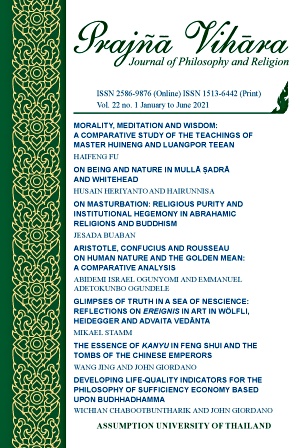ON MASTURBATION: RELIGIOUS PURITY AND INSTITUTIONAL HEGEMONY IN ABRAHAMIC RELIGIONS AND BUDDHISM
Abstract
This paper analyzes the attitudes to masturbation in the Abrahamic religions and Buddhism. Textual interpretation has been used to scrutinize the primary sources within religious texts, while Weber’s ideas on legitimacy and domination have been employed to elucidate the effect of religious injunctions against masturbation. The findings reveal that the primary sources used to condemn masturbation in Abrahamic religion is not clear, and so it should not be considered dogmatically. The interpretations of those sources draw connection between masturbation and such ideas as lust and impurity, which are measured with reference to a spiritual elite. Buddhism sees sexual desire in relation to suffering that must be able to overcome for those who desire enlightenment. Though its theological background is different the Buddhist examples help clarify the Abrahamic worldviews on masturbation. Moreover, the holy status of Catholic priests and Buddhist monks, who are viewed as a spiritual elite, is achieved by abstaining from sex and masturbation, and this hierarchy serves to designate as sinful and impure the practice of masturbation.
Downloads
Published
Issue
Section
License
Consent to Publish and Transfer of Copyright
By publishing in Prajñā Vihāra, the author agrees to transfer and assign to Assumption University of Thailand as the Publisher of the Journal, the copyright to the Article in any form, including any and all rights, interests and claims related to it.
The author does retain the following rights:
- The right to make further copies of the published article for their use in classroom teaching.
- The right to reuse all or part of the published article in a compilation of his or her own works or in textbooks of which they are the author or coauthor.
- The right to make copies of the published article for internal distribution within their academic institution.
- All proprietary rights other than copyright, such as patent rights.
- The Article is his or her original work, and has not been published previously and is not under consideration for publication elsewhere.
- It does not contain any matter that is obscene, libelous, or contrary to law.
- They have obtained the necessary license or written authority and paid any and all related fees for the use and reproduction of text, tables, illustrations and other copyrighted work from the owners of the intellectual property rights, and can furnish the Publisher copies of the license/written authority and proof of payment of related fees upon the signing of this Agreement.
- They have the consent of the Co-Authors of the article upon the signing of this Agreement.
- In the event that they intend to republish, reprint or translate all or part of the Article in other publications, they will secure the prior written permission from the journal Editor.
Prajñā Vihāra adopts the Creative Commons Attribution (CC BY-NC-ND) license


